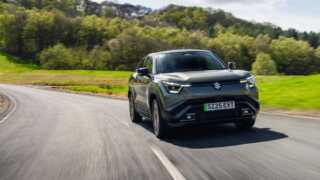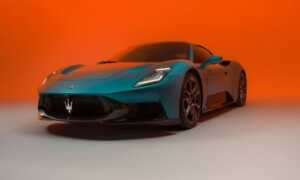Share via: Maruti Suzuki is gearing up to launch the e-Vitara in India in September 2025, ahead of the festive season, while Suzuki has already introduced the made-in-India e-Vitara in the UK. …Read More Maruti Suzuki is gearing up to launch the e-Vitara in India in September 2025, ahead of the festive season, while Suzuki has already introduced the made-in-India e-Vitara in the UK. Get Launch Updates on Notify me Maruti Suzuki e-Vitara is one of the most awaited electric cars in the Indian passenger vehicle market. The e-Vitara is slated to launch in India in September 2025, right ahead of the festive season. It is going to be the first electric car from the biggest car manufacturer in India, in terms of sales volume. With just two months left before the launch of the electric SUV, range and charging details of the Maruti Suzuki e-Vitara have been revealed. With the made-in-India Suzuki e-Vitara already introduced in the UK, the specification sheet reveals that the electric SUV promises to squeeze a range of up to 426 km (WLTP) on a full charge, while the battery pack is capable of charging 10-80 per cent in just 45 minutes, using a DC fast charger. Maruti Suzuki e-Vitara: Range and chargingThe Suzuki e-Vitara sold in the UK market is available in two battery pack options – 49 kWh and 61 kWh units. The smaller battery pack offers a WLTP claimed range of up to 344 km on a single charge. This battery pack is available with a single front-wheel drive setup that churns out 142 bhp of peak power and 193 Nm of maximum torque. The bigger battery pack is available with both FWD and AWD options. The FWD variant promises up to 426 km range on a full charge. The electric motor paired with this battery pack in the FWD version generates 171 bhp peak power and 193 Nm of maximum torque. On the other hand, the dual electric motor-equipped version generates 181 bhp peak power and 307 Nm of maximum torque. The battery pack on this variant offers up to 395 km of range on a single charge. Speaking of the charging time for the battery packs, the 49 kWh battery pack is capable of charging 10-100 per cent using a 7 kW AC charger in 6.5 hours, while an 11 kW AC charger does the same in 4.5 hours. For the 61 kWh battery pack, the time is increased to nine hours and 5.5 hours, respectively. Both battery packs can be charged from 10 to 80 per cent in just 45 minutes using a DC fast charger. Check out Upcoming EV Cars in India. First Published Date: 16 Jul 2025, 11:30 am IST
Source: hindustantimes.com






